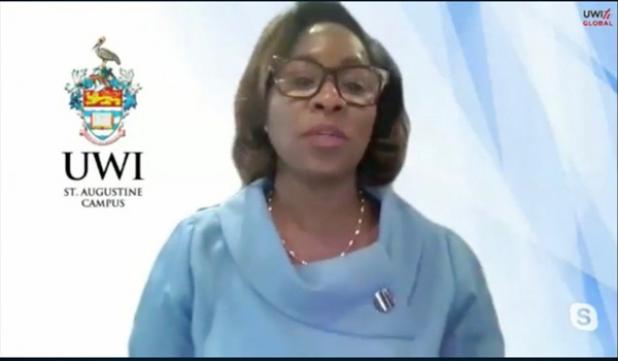
Dr. Marlene Attzs during yesterday”s virtual symposium.
Brace for secondary economic impacts
There is a call for nations across the region to pay greater attention to the indirect economic impacts of COVID-19. Being stared in the face daily by the glaring reality of the effects of the pandemic, we are being reminded to think a bit more broadly as we navigate through the global outbreak.
During a virtual symposium put on yesterday by the University of the West Indies titled “The Impact of COVID-19 on Health Systems”, UWI Economics Lecturer, Dr. Marlene Attzs, noted that governments in the Caribbean needed to look a bit beyond the surface to see the the true impacts of the lockdowns on their economies.
Noting that worldwide lockdowns had seen a disruption of food supply chains as much of what we consume in the region directly and indirectly is imported from the United States, China and Europe, Dr. Attzs stated that the region’s health sector was also significantly impacted.
Attempting to name a Caribbean country that commanded the fiscal space to allow for extra spending, she said that we would all incur additional debt to unsustainable levels. “I think we need to recognise that what is happening now is unprecedented in our lifetime. So we are going to engage in an unprecedented levels of spending to treat with controlling the spread of this virus. The challenge is that we have to spend more and we are going to be earning significantly less in our economic spaces. So there is lower economic activity, lower and declining economic growth, higher levels of unemployment – because some of us have the “luxury” of being able to work from home. There are many of us in our societies who do not have that luxury. Their day-to-day jobs require them to leave home and go out and earn a living.”
Stating that there will be large budget deficits as the gap between what our governments are spending and what they are earning was widening, she drew reference to her native Trinidad and Tobago as their deficit is projected to triple as a result of COVID-19. Noting that the twin-island republic was feeling the pinch of the contraction in travel as an oil and gas producer, she highlighted the fact that similar ripples were being felt by the non-commodity economies. “For the other Caribbean countries which are tourism-based economies, you have seen a similar kind of fallout with some economic estimates suggesting that in tourism-based economies, their revenues can decline by as much 50%. Imagine if you would, that the high season for tourism-dependent economies would have been December through March, April. What was happening in the world at that time? Cutting back on international travel and therefore, what was happening in the international space was already beginning to impact on our economies. Both the commodity-based economies such as Trinidad and Tobago and Guyana, but also in the tourism-based economies such as the OECS countries, Jamaica, etc.”
Going on to speak on the varying measures of lockdown across the region and how it affects the closure of schools, non-essential business places, imports and exports and other variables on what she called “the easy side of the equation”, Dr. Attzs explained that there would also be real fiscal implications for the countries of the region. “One of the things COVID-19 has shown are what I call the fault lines in our systems – inequality and inequity fault lines. We make assumptions about how we can respond or one”s capacity to respond to COVID-19. Even the articulation about social distancing and about washing your hands, those prescriptions and advisories assume people in our societies can be afforded the luxuries of either social distancing or that they have access to water that they can wash their hands as often as is being prescribed in terms of the protocols.” she said.
Although the pandemic had seen every member of the region”s society touched in some form or fashion, Dr. Attzs said that the situation did allow for some opportunities. “It allows interdisciplinary and multidisciplinary research on the socio-economic impacts of the pandemic on our economies and the challenge is not simply the direct economic impacts that we can easily quantify. So you can talk about GDP, you can talk about consumption patterns, you can talk about expenditure, but it is really to unearth those secondary or indirect impacts from the pandemic so the we can get an understanding of the effect of the pandemic and appropriate policy responses can be crafted. If we don”t, we may find ourselves putting forward or advancing policy prescriptions that do not really address the challenges that we face at this time over the past couple of weeks.” she said. (MP)
